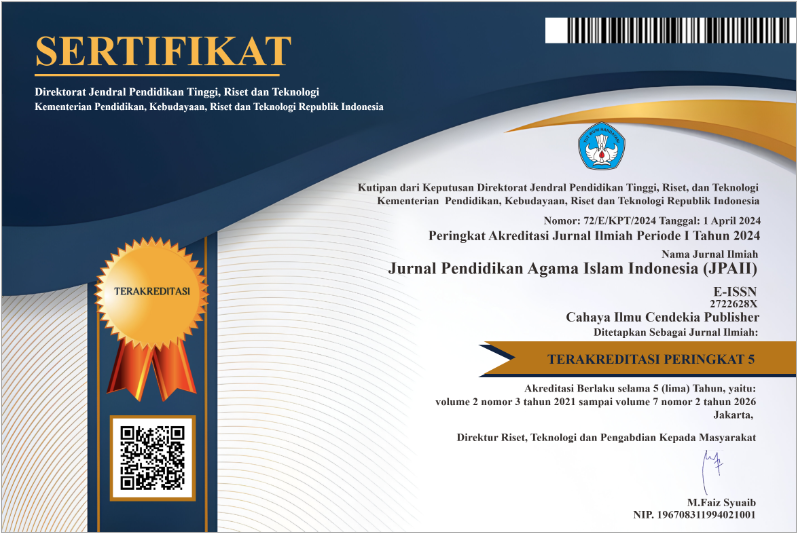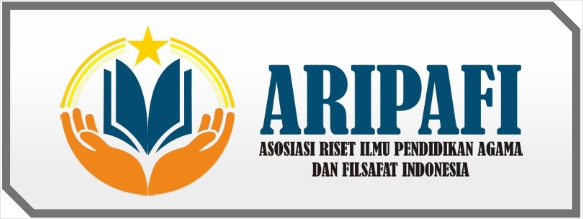Study the Virtue of Patience: Lessons from Surah Al-Baqarah and Ali Imran in the Qur'an
Abstract
Purpose of the study: The aim of this research is to determine the concept of patience education and the implementation of patience education in Q.S surah al-Baqarah verses 45, 153, 294.
Methodology: The research used by researchers is library research, this research involves collecting data related to the research object. Data analysis in the form of non-statistical analysis is suitable for descriptive data or textual data.
Main Findings: The findings in this research provide a little more knowledge about: The important education of patience which has been explained in Q.S surah al-Baqarah verses 45, 153, 294 and Ali Imran verses 125, 186, 200, apart from providing calm for life. Patience also has the function of solving problems well and not being hasty in carrying them out, so that people who implement this trait will find it easy to obey Allah and His Messenger.
Novelty/Originality of this study: This research carries originality in exploring the dimensions of patience education contained in the verses of the Qur'an, especially Surah Al-Baqarah verses 45, 153, and 249, as well as Ali Imran verses 125, 186, and 200. The focus of the research is on analysis in-depth understanding of the historical, linguistic context and interpretation of these verses, in order to reveal the nuances and wisdom contained in patience education. Thus, this research makes an important contribution in enriching the experience of Islamic religious education in madrasah and increasing its relevance to the demands of the times.
References
A. Alfirzan, Y. Nasri, and N. Gistituati, “Implementasi Kebijakan Pendidikan,” J. Pendidik. Tambusai, vol. 5, no. 1, pp. 1521–1529, 2021, doi: 10.31004/jrpp.v4i2.3254.
M. Z. Anwar, Fathan, Warto, and O. N. Hidayati, “Transformation of Economic Theology For Community Empowerment A Case Study on Pesantren-Based Bank Wakaf Mikro,” J. Indones. Islam, vol. 17, no. 1, pp. 76–99, 2023, doi: 10.15642/JIIS.2023.17.1.76-99.
J. Kormos and K. Csizér, “The Interaction of Motivation, Self-Regulatory Strategies, and Autonomous Learning Behavior in Different Learner Groups,” TESOL Q., vol. 48, no. 2, pp. 275–299, 2014, doi: 10.1002/tesq.129.
Y. Dror, “Verbs of saying in the qurʾān: The case of qāla,” Al. Qantara., vol. 42, no. 1, pp. 1–15, 2021, doi: 10.3989/alqantara.2021.003.
R. Triana, “Internalisasi Jihad Dalam Pendidikan Karater,” Edukasi Islam. J. Pendidik. Islam, vol. 07, no. 1, pp. 101–129, 2018, doi: 10.30868/ei.v7i01.208.
Apdoludin and Martinisyamin, “Modeling Analysis, Findings, Development, Organizing the Material and Learning for Students in Islamic Boarding Schools,” J. Pendidik. Islam, vol. 8, no. 1, pp. 25–36, 2022, doi: 10.15575/jpi.v8i1.15277.
C. D. Güss, D. Hauth, F. Wiltsch, C. C. Carbon, A. Schütz, and K. Wanninger, “Patience in Everyday Life: Three Field Studies in France, Germany, and Romania,” J. Cross. Cult. Psychol., vol. 49, no. 3, pp. 355–380, 2018, doi: 10.1177/0022022117735077.
S. Waluyo, “Nilai-Nilai Pendidikan Akhlak Dalam Al-Qur’an,” Al-Riwayah J. Kependidikan, vol. 10, no. 2, pp. 269–295, 2018, doi: 10.47945/al-riwayah.v10i2.35.
G. Moltafet, M. Mazidi, and S. Sadati, “Personality traits, religious orientation and happiness,” Procedia - Soc. Behav. Sci., vol. 9, pp. 63–69, 2010, doi: 10.1016/j.sbspro.2010.12.116.
I. Saripah, “Peran Orang Tua dan Kketeladanan Guru dalam Peningkatan Mutu Pendidikan Akhlak Siswa Madrasah Ibtidaiyah,” J. Ilm. Pendidik., vol. 10, no. 2, pp. 19–32, 2016, [Online]. Available: https://jurnal.uinbanten.ac.id/index.php/studiadidaktika/article/view/80/82
A. Mas’ud, A. Z. Fuad, and A. Zaini, “Evolution and orientation of Islamic education in Indonesia and Malaysia,” J. Indones. Islam, vol. 13, no. 1, pp. 1–20, 2019, doi: 10.15642/JIIS.2019.13.1.21-49.
H. I. I. L. Primalita and A. Hidayah, “Konsep Sabar dalam Perspektif Al-Ghazali dan Implementasinya pada masa Pandemi Covid-19,” Acad. J. Islam. Princ. Philos., vol. 2, no. 1, pp. 43–57, 2021.
A. Solihin, U. Supriadi, and E. Suresman, “The Concept of Patience in Islam and Its Implications for Education,” TARBAWY Indones. J. Islam. Educ., vol. 9, no. 2, pp. 184–193, 2022, doi: 10.17509/t.v9i2.48771.
L. Rahmawati, “Konsep Sabar dalam Perspektif Ulama Tafsir,” Al-Hikmah J. Theosof. dan Perad. Islam, vol. 5, no. 2, pp. 182–200, 2023.
A. Novia Ariqoh, N. Ngarifin, and R. Suyud El-Syam, “Nilai-Nilai Pendidikan Karakter Tentang Bersikap Sabar Pada Kisah Nabi Yusuf Dalam Al-Qur’an (Kajian Q.S. Yusuf Ayat 90),” J. Pendidik. Indones., vol. 3, no. 6, pp. 584–590, 2022, doi: 10.36418/japendi.v3i6.985.
U. Muaziroh and Z. ‘Amilatun Sholiha, “Aktualisasi Konsep Sabar dalam Perspektif Alquran (Studi Terhadap Kisah Nabi Ayyub),” JurnalAt-Tibyan, vol. 3, no. 2, pp. 200–210, 2018, doi: 10.32505/tibyan.v3i2.616.
I. S. Wekke, A. A. Amiruddin, and F. Firdaus, “Nasr Hamid Abu Zayd and The Hermeneutical of Qur’an,” Epistemé, vol. 13, no. 2, pp. 483–507, 2018, doi: 10.21274/epis.2018.13.1.483-507.
M. Z. Mutaqin, “Konsep Sabar dalam Belajar dan Implikasinya Terhadap Pendidikan Islam,” J. Islam. Educ. Teach. Civiliz., vol. 3, no. 1, pp. 1–16, 2022, [Online]. Available: https://ejournal.uinsaizu.ac.id/index.php/maghza/article/view/6003
A. N. Kawakip and Sulanam, “The Practice of Shared Values and Islamic Educational Identity,” J. Indones. Islam, vol. 17, no. 1, pp. 27–53, 2023, doi: 10.15642/JIIS.2023.17.1.27-53.
S. Hadi, “Konsep Sabar Dalam Al-Qur’an,” J. MADANI Ilmu Pengetahuan, Teknol. dan Hum., vol. 1, no. 2, pp. 473–498, 2018.
A. B. Cohen and K. A. Johnson, “The Relation between Religion and Well-Being,” Appl. Res. Qual. Life, vol. 12, no. 3, pp. 533–547, 2017, doi: 10.1007/s11482-016-9475-6.
J. W. Creswell, Research Design Qualitative, quantitative, and mixed methods approaches. Thousand Oaks, CA: Sage, 2014.
A. E. Bülbül and G. Izgar, “Effects of the Patience Training Program on Patience and Well-Being Levels of University Students,” J. Educ. Train. Stud., vol. 6, no. 1, p. 159, 2017, doi: 10.11114/jets.v6i1.2900.
A. Kuswaya and M. Ali, “The concept of peace in the Qur’an: A socio-thematic analysis of Muslims’ contestation in Salatiga, Indonesia,” Qudus Int. J. Islam. Stud., vol. 9, no. 1, pp. 73–102, 2021, doi: 10.21043/QIJIS.V9I1.10483.
Marwazi and M. Husnul Abid, “Traditional Madrasah, State Policies and the Rise of Integrated Islamic Schools in Jambi,” J. Indones. Islam, vol. 15, no. 1, pp. 75–102, 2021, doi: 10.15642/JIIS.2021.15.1.75-102.
A. Ismail and A. Solahuddin, “Psychology of patience and semantic approach to the Qur’an: Meaning of Qāla on Istirjā’ Verse,” Cogent Arts Humanit., vol. 10, no. 1, 2023, doi: 10.1080/23311983.2023.2168342.
A. Eliüşük Bülbül, “The effect of patience training on university students’ patience and life satisfaction levels,” African Educ. Res. J., vol. 9, no. 3, pp. 712–719, 2021, doi: 10.30918/aerj.93.21.103.
K. Nikmah, “Meaning Variations of Qāla (قال) in Indonesian Language,” Izdihar J. Arab. Lang. Teaching, Linguist. Lit., vol. 2, no. 2, pp. 77–100, 2019, doi: 10.22219/jiz.v2i2.9909.
M. Tajab, A. Madjid, and M. Hidayati, “Psychology of patience in al-MisbĀh exegesis,” Humanit. Soc. Sci. Rev., vol. 7, no. 5, pp. 1221–1230, 2019, doi: 10.18510/hssr.2019.75161.
E.-S. El-Aswad, “Patience in Sunni Muslim Worldviews,” Encycl. Psychol. Relig., no. July, pp. 1318–1321, 2014, doi: https://doi.org/10.1007/978-1-4614-6086-2_9317.
Copyright (c) 2024 M. Mustholiq Alwi, Sayyid Husein, Witsarut Lohwithee

This work is licensed under a Creative Commons Attribution 4.0 International License.
Authors who publish with this journal agree to the following terms:
- Authors retain copyright and acknowledge that the Jurnal Pendidikan Agama Islam Indonesia (JPAII) is the first publisher licensed under a Creative Commons Attribution 4.0 International License.
- Authors are able to enter into separate, additional contractual arrangements for the non-exclusive distribution of the journal's published version of the work (e.g., post it to an institutional repository or publish it in a book), with an acknowledgment of its initial publication in this journal.
- Authors are permitted and encouraged to post their work online (e.g., in institutional repositories or on their website) prior to and during the submission process, as it can lead to productive exchanges and earlier and greater citation of published work.







.png)
.png)





















